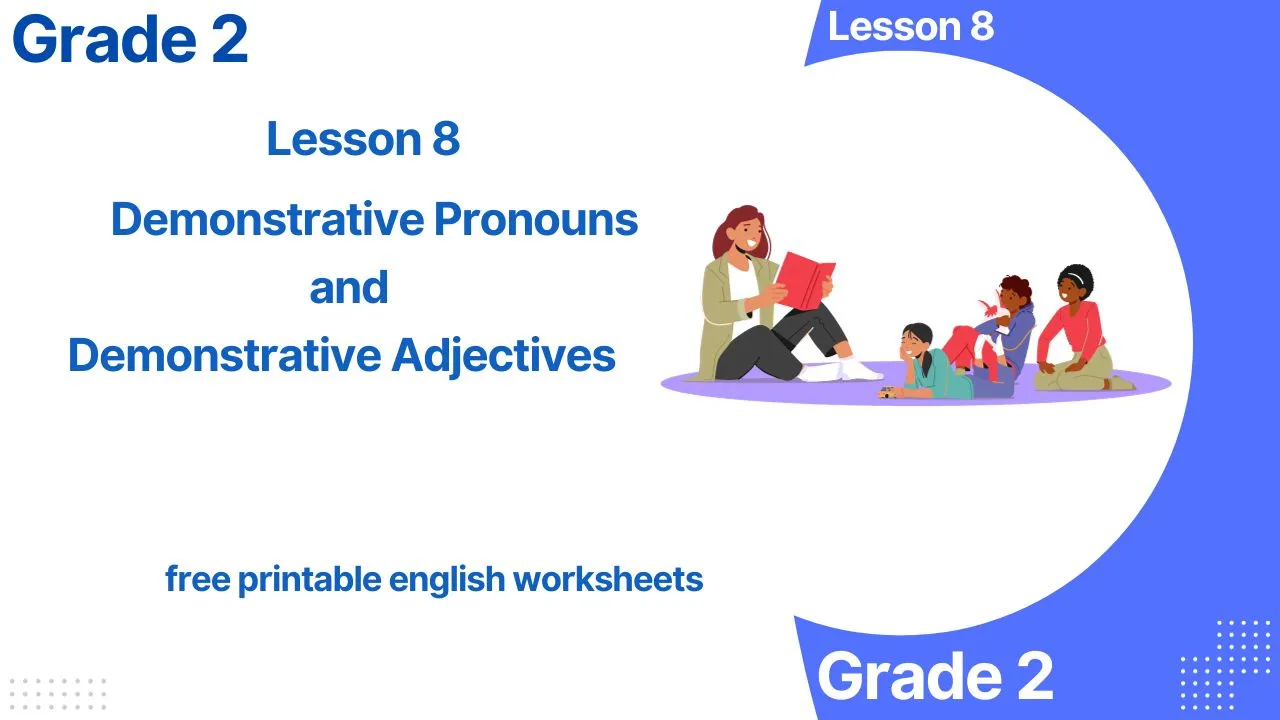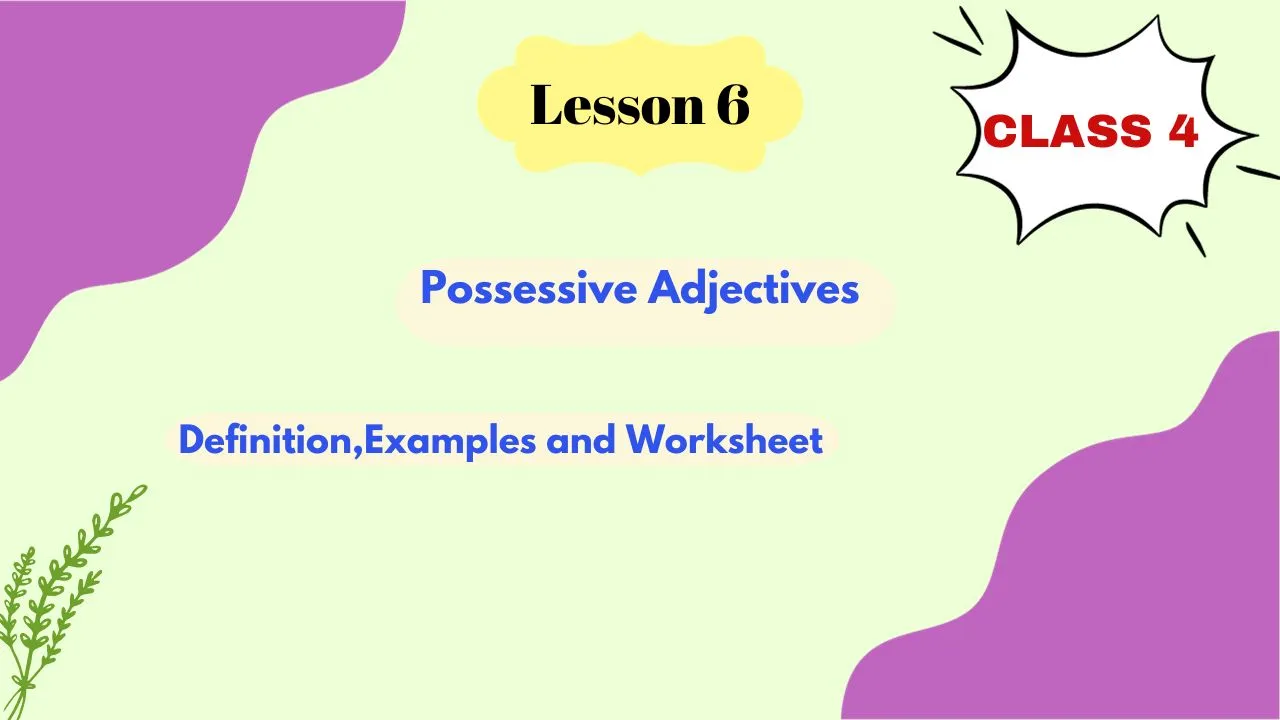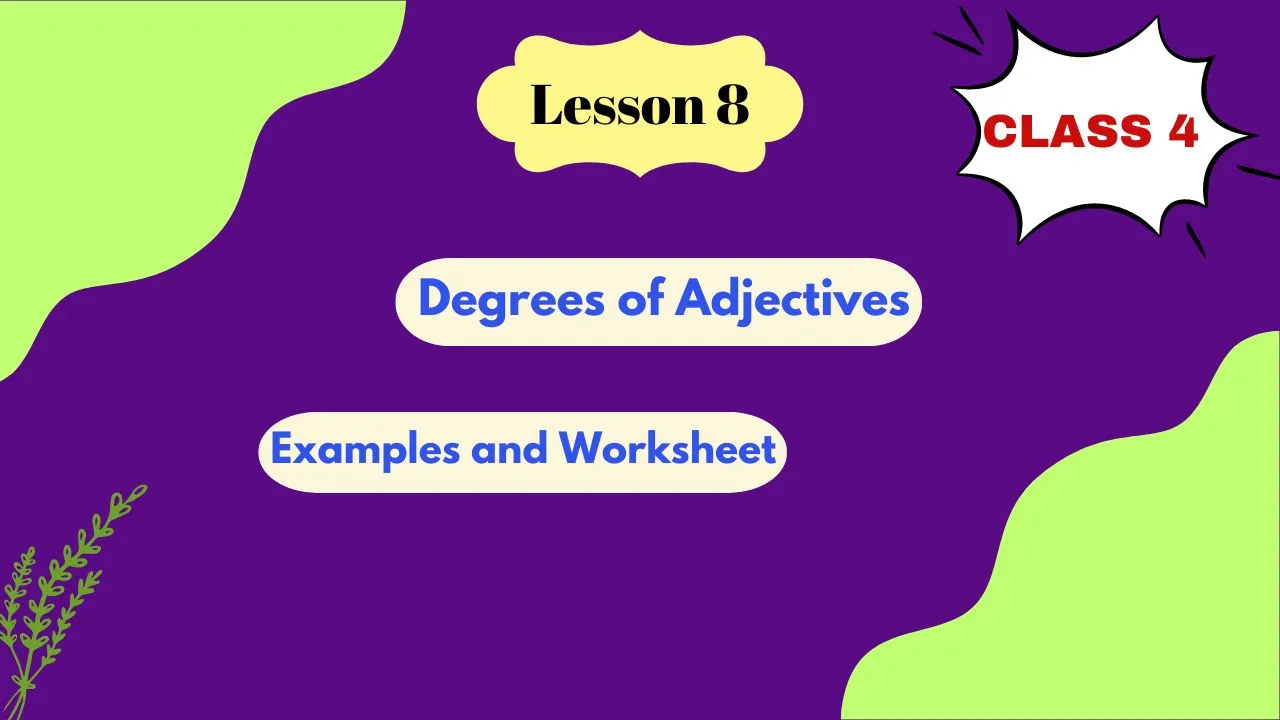Degree of Adjectives Class 5 English Grammar has been prepared for learning English Grammar of Class 5 under CBSE, ICSE, and Other State boards as Lesson No 27. Class 5 students in their English Grammar learning process will get help from the Degree of Adjectives Class 5 English Grammar to achieve better speaking and writing skills in English.
This Lesson 27, Degree of Adjectives Class 5 English Grammar contains – Positive Degree, and Comparative Degree, Superlative Degree, with a practice worksheet at the end for better knowledge for class 5.
English Grammar eBook Class 5
Degree of Adjectives: English Grammar Class 5
Adjectives can be used to compare people and things. Adjectives are of three degrees-
- positive
- comparative
- superlative
Positive Degree:
An adjective is said to be in the positive degree when there is either no comparison or a comparison is made using so…as/as…as.
Example:
- It is cold today.
- Latha is a tall girl.
- He is as intelligent as his father.
- I am not so old as you are.
Comparative Degree:
An adjective is said to be in the comparative degree when two people or things having the same quality are compared using
Example:
- Yesterday was colder than today.
- Priya is taller than Latha.
Superlative Degree:
An adjective is said to be in the superlative degree when three or more people or things having the same quality are compared.
Example:
- Sunday was the coldest day of the week.
- Maya is the tallest girl in the class.
Formation of Comparative and Superlative Degrees
1. For most adjectives, the comparative and superlative degrees are formed by adding er and est, respectively, to the positive degree.
Example:
| Positive | Comparative | Superlative |
| small | smaller | smallest |
| long | longer | longest |
| tall | taller | tallest |
2. For adjectives ending in e, the comparative and superlative degrees are formed by adding r and st to the positive degrees, respectively.
Example:
| Positive | Comparative | Superlative |
| pure | purer | purest |
| pale | paler | palest |
| wise | wiser | wisest |
3. For adjectives ending in a consonant and y, we change the y to i and then add er or est to the positive degrees, to form the comparative and superlative degrees respectively.
Example:
| Positive | Comparative | Superlative |
| easy | easier | easiest |
| lazy | lazier | laziest |
| heavy | heavier | heaviest |
4. For adjectives ending in a vowel and y, we only add er and est to the positive degrees, to form the comparative and superlative degrees respectively.
Example:
| Positive | Comparative | Superlative |
| grey | greyer | greyest |
| gay | gayer | gayest |
5. For adjectives that consist of only one syllable, end in a consonant, and have a short vowel sound before the consonant, we double the consonant at the end and then add er and est.
Example:
| Positive | Comparative | Superlative |
| hot | hotter | hottest |
| thin | thinner | thinnest |
6. For adjectives that are made of two or more syllables, we usually add more and most to form the comparative and superlative degrees, respectively.
Example:
| Positive | Comparative | Superlative |
| intelligent | more intelligent | most intelligent |
| difficult | more difficult | most difficult |
7. Some adjectives do not follow any rule.
Example:
| Positive | Comparative | Comparative |
| bad | worse | worst |
| evil | worse | worst |
| good | better | best |
| ill | worse | worst |
| far | farther | farthest (distance) |
| far | further | furthest (additional) |
| well | better | best |
| late | later | latest (time) |
| late | later | last (position) |
| little | less | least |
| much | more | most |
| many | more | most |
| old | older | oldest |
| old | elder | eldest |
Order of Adjectives
When there is more than one adjective before a noun, we follow the order.
| 1 | 2 | 3 | 4 | 5 | 6 | 7 | 8 |
| Quantity | Quality | Size | Shape | Age | Colour | Origin | Material |
| five | good | big | round | old | bright | Indian | woolen |
| ten | beautiful | smaall | square | old | green | Bengali |
Note:
(a) If we have more than two adjectives in a sentence, we use commas after each
adjective except the last one. (I have a big, red, Mexican hat.)
(b) If there are only two adjectives to describe the noun, we do not put a comma
between the adjectives. (I bought some colorful Kashmiri carpets.)
(c) Adjectives make the sentence more interesting and descriptive. It is not necessary to use adjectives in every sentence and with all nouns.
Worksheet: Degree of Adjectives Class 5 English Grammar
1. Identify the degrees of comparison used in these sentences.
1. Gold is the most precious metal.
2. North America is a big continent.
3. Africa is bigger than North America.
4. Mt Everest is higher than the Kanchenjunga.
5. These mountains are higher than those.
6. This is the funniest film I have ever seen.
7. Asia is the biggest continent in the world.
8. Malathi is the most intelligent girl in her class.
9. Monica’s task was more challenging than Kiran’s.
10. Mt Everest is the highest mountain in the world.
11. This novel is more interesting than the one you gave me.
12. This sum was the most difficult of all sums.
2. Underline the adjectives in these sentences and say whether the adjectives are in the positive, comparative or superlative degree.
1. Rajni is cleverer than him. ____________
2. This knife is sharper than that one. ____________
3. An elephant is heavier than a giraffe. ____________
4. She is the most talkative girl in the class. ____________
5. Most children enjoy playing with sand on a beach. ____________
6. Getting him to study is the most difficult thing to do. ____________
7. The living room is the biggest room in the apartment. ____________
8. Have you read the latest edition of the school magazine? ____________
9. Both Mr and Mrs Singh are tall, but their son is taller than them. ____________
10. It is more important to participate in than to win the competitions. ____________
11. John and Jim are twins. John is a better chess player than Jim, while Jim is a better swimmer. ____________
12. The last thing you should do when you have a cold is to drink cold water. ____________
3. Fill in each blank with the correct form of the adjective given in the brackets.
1. How is Hari? Is he ____________ (good) now?
2. She is ____________ (bad) singer of the lot.
3. Rain water is____________ (pure) river water.
4. The Rajdhani is ____________ (fast) most trains.
5. She is ____________ (patient) girl I have met.
6. Rahul is ____________ (brilliant) student in his class.
7. This sum is ____________ (difficult) one in this exercise.
8. Bill Gates is one of ____________ (rich) men in the world.
9. Siberia is one of ____________ (cold) places on earth.
10. Yudhishthira was ____________ (old) of the Pandavas.
11. Rita and Asif were declared ____________ (good) speakers in the debate.
12. ____________ (few) people attended the meeting today than yesterday.
Read these sentences.
This house is as big as that one.
Ravi is as tall as Ahmed.
We use the as + adjective + as a phrase to compare two things that are similar.
Now, read these sentences.
This car is not so/as fast as that one.
Ravi is not so/as tall as Prateek.
We use the not so/as + adjective + as the phrase to compare two things that are not similar.
D. Now, make comparisons as indicated.
1. Sugar is ____________ (sweet) honey. (Use as…as.)
2. Pearls are ____________ (expensive) diamonds. (Use not so/as…as.)
3. Vishal is ____________ (strong) Harish. (Use not so/as…as.)
4. Rajan is ____________ (handsome) Rehman. (Use not so/as…as.)
5. This book ____________ (interesting) that book. (Use not so/as…as.)
6. Tom is ____________ (clever) as the other boys in his class. (Use as…as.)
7. Paris is ____________ (busy) London. (Use as…as.)
8. Mussoorie is ____________ (hot) Moscow. (Use not so/as… as.)
9. The deer is ____________ (fast) the cheetah. (Use not so/as…as.)
E. Put these adjectives in the correct columns according tp the way they form their superlative.
loud large expensive thin good tall much light big simple bad red perfect cheap busy lazy anxious fat angry late brave important dirty fine
| est | st | iest | double consonant+est | most | irregular |
F. Identify the adjectives and add appropriate punctuation marks.
1. I want to buy a wonderful, antique, dark, Kashmiri table.
2. I found a big, square steel box.
3. It was an old navy blue nylon bag.
4. I saw a large ny red plastic bucket.
5. We bought a beautiful old vase yesterday,
6. I bought a beautiful new green cotton sari.
7. This is an excellent round antique wooden table.
8. I love that big vintage green car parked on the street.
9. A Buddhist monk gave us a fantastic old, Tibetan souvenir,
10. I bought some lovely small Kashmiri carpets and rugs.
G. Rewrite these adjectives and nouns in the correct order. Use commas between adjectives where required.
1. a sharp pencil red lead
__________________________________
2. a small biscuit chocolate round
__________________________________
3. a warm beach sandy beautiful
__________________________________
4. a handsome brilliant Hollywood actor
__________________________________
5. a singer talented young Indian
__________________________________
6. a yummy hot chocolate cake
__________________________________
7. fresh cool morning breeze
__________________________________
8. a warm soft pink blanket
__________________________________
7 luft warm, pink Wonkt.
__________________________________
Class 5 English Grammar: All Topics & Chapters????:
Chapter 1. Parts of speech
Chapter 2. The sentence and Types
Chapter 3. Subject and Predicate
Chapter 4. Nouns and their Types
Chapter 5. Noun and Number
Chapter 6. Noun and Gender
Chapter 7. Articles
Chapter 8. Pronouns and their Classifications
Chapter 9. Verbs and Types of Verbs
Chapter 10. Regular Verbs Irregular Verbs List
Chapter 11. Subject and Verb Agreement
Chapter 12. Simple Present Tense
Chapter 13. Present Continuous Tense
Chapter 14. Present Perfect Tense
Chapter 15. Present Perfect Continuous Tense
Chapter 16. Simple Past Tense
Chapter 17. Past Continuous Tense
Chapter 18. Past Perfect Tense
Chapter 19. Past Perfect Continuous Tense
Chapter 20. Simple Future Tense
Chapter 21. Future Continuous Tense
Chapter 22. Future Perfect Tense
Chapter 23. Future Perfect Continuous Tense
Chapter 24. Tense Exercises
Chapter 25. Modal Verbs
Chapter 26. Adjectives and their Types
Chapter 27. Degree of Adjectives
Chapter 28. Adverbs and Comparison
Chapter 29. Prepositions and their Uses
Chapter 30. Conjunctions
Chapter 31. Direct and Indirect Speech
Chapter 32. Transformation of Sentences
Chapter 33. Punctuation







